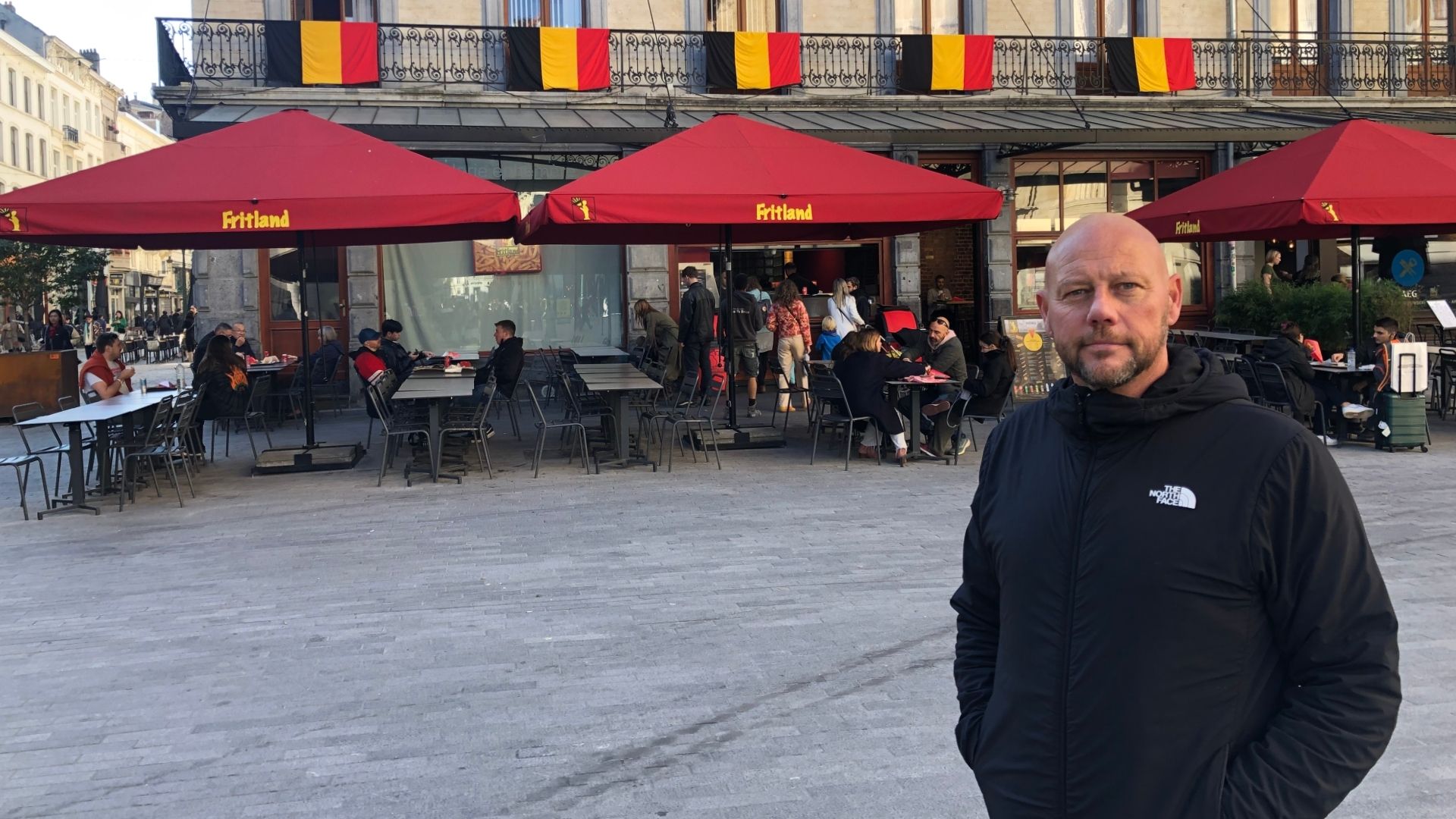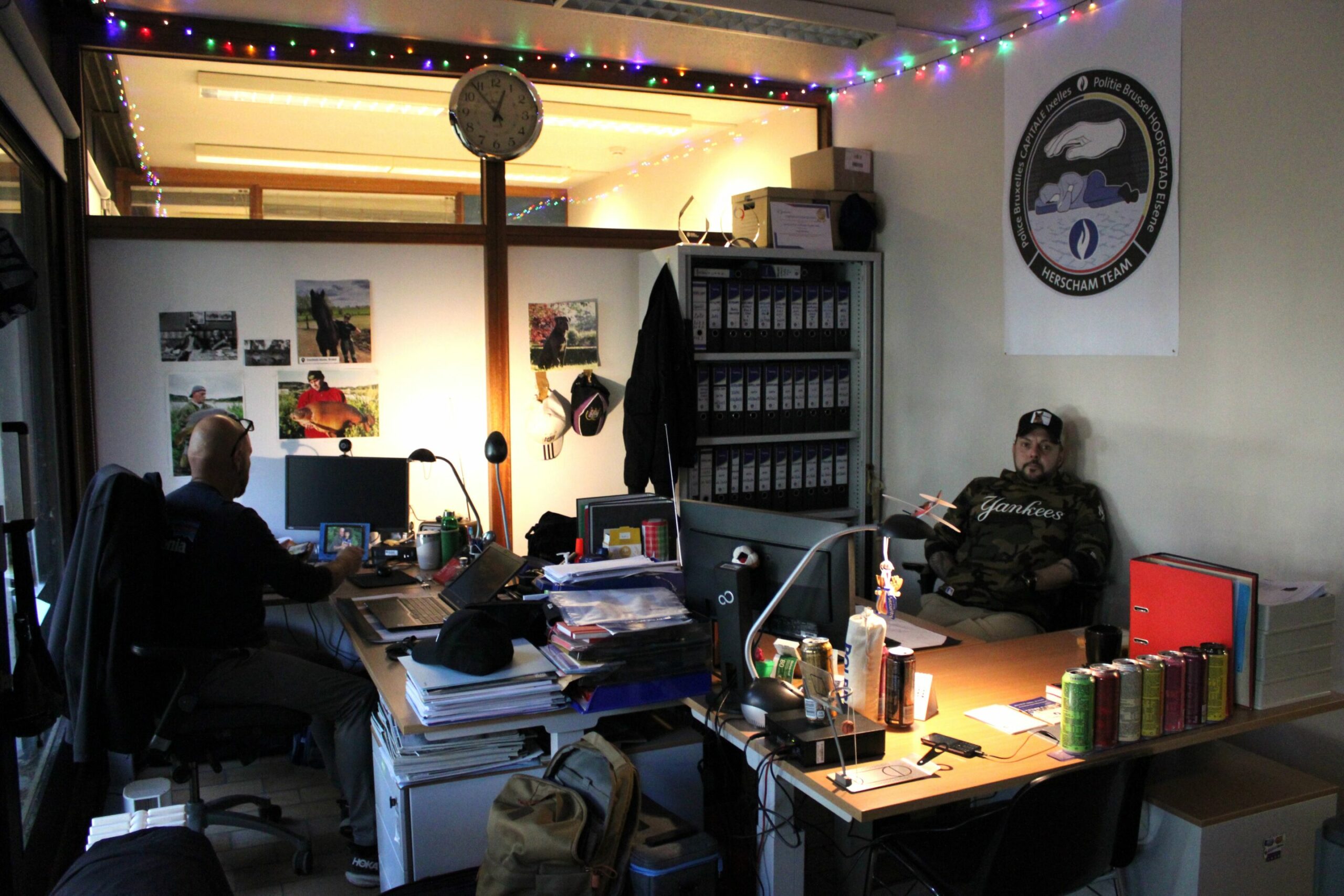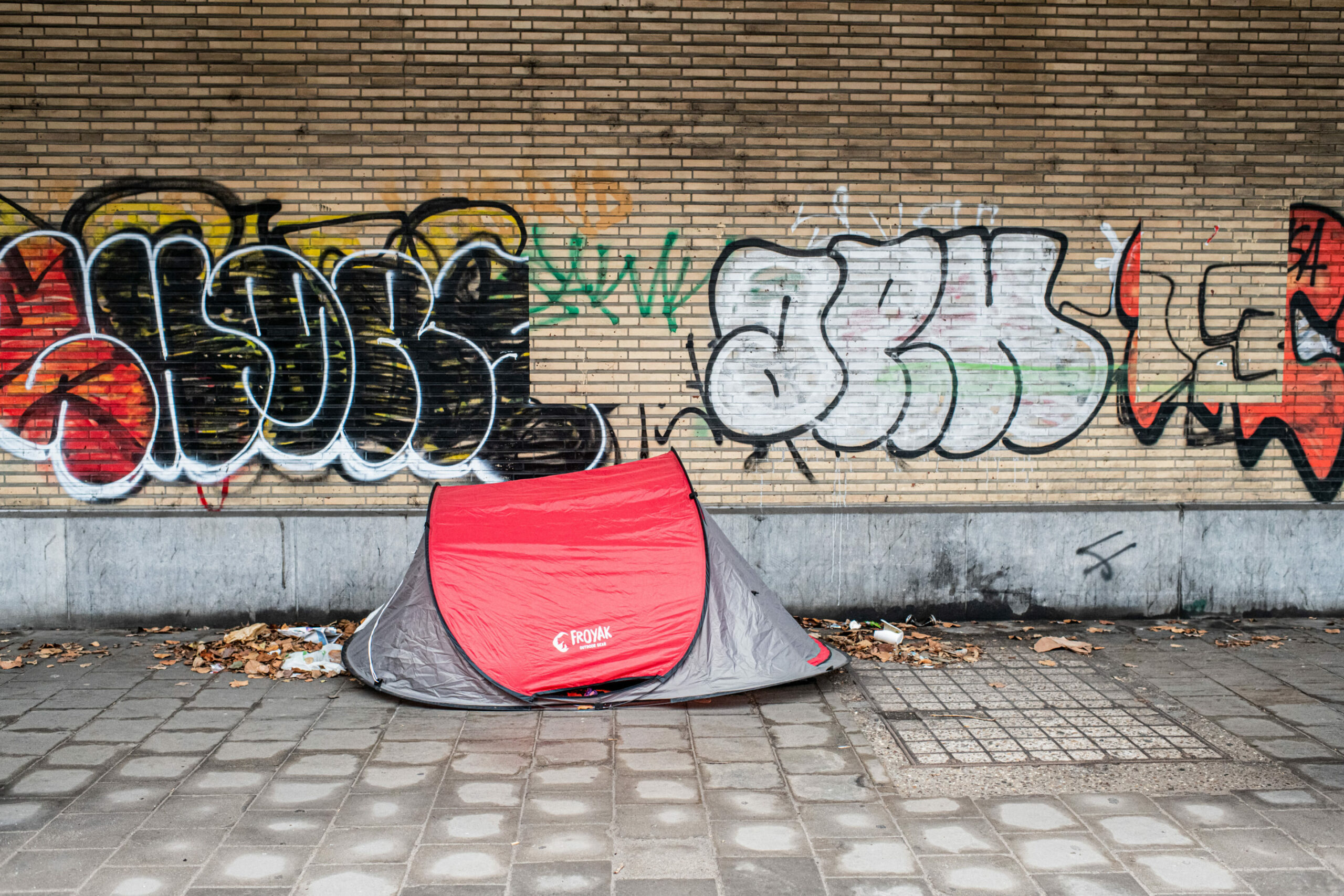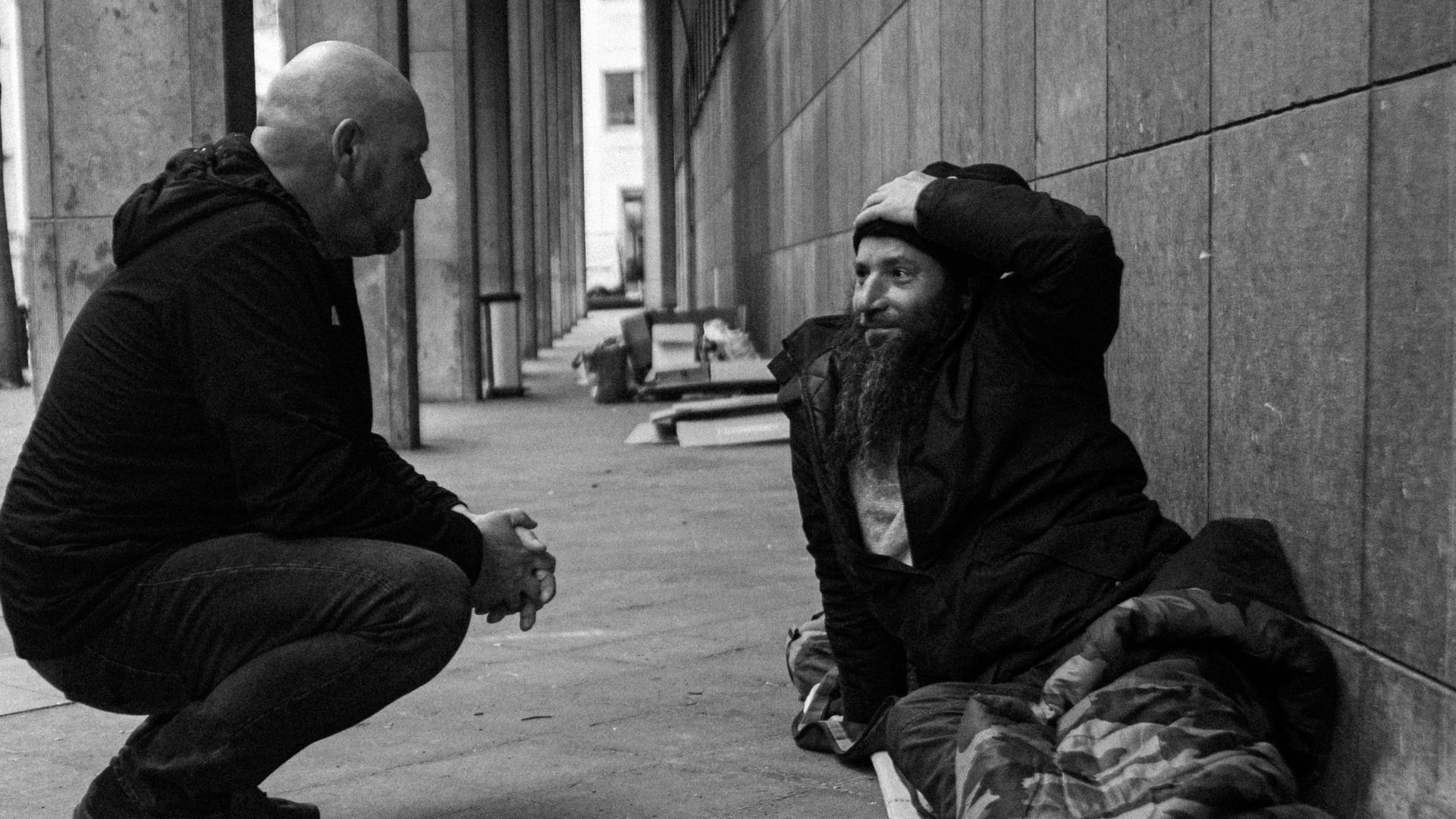Chris Vandenhaute knows everyone. As we weave through Brussels city centre together, he has a smile and a wave for almost everyone we encounter on the streets, be it a fellow police officer, a business owner or even, crucially, a homeless person.
On the cusp of 50, Vandenhaute has been a police officer for 25 years – exactly half his life. He now dedicates his work to assisting the city's homeless population, a cohort that most would prefer to ignore. He leads Team Herscham, a police unit that provides an administrative path out of homelessness for those who have fallen through the cracks. "We go into those cracks," he says.
On a bright autumn morning, I accompany Vandenhaute on his daily pilgrimage around Brussels city centre. We leave his office next to the Parc Royal, cut through Mont des Arts towards Central Station, go out the other side to eventually pass Bourse, swing by Place Saint Catherine, walk up to Le Petit Chateau next to the canal and circle all the way back around.
"The police are seen as a symbol of authority and oppression," he tells me as we walk. "We try to be the other side of that."

Chris Vandenhaute on patrol. Credit: The Brussels Times
'You don't exist if you can't prove who you are'
Team Herscham's office is true to police stereotypes, with a masculine environment that includes large portraits of fishing trips on the walls, empty energy drinks lined up on a desk and slogans like 'you deserve a beer!' making up the decor. But its focus on non-judgement sets Herscham apart from run-ins its clientele may have had with the police in the past.
The project was founded by officer Nico Lauwers in November 2003. The name alludes to the god of beggars and people excluded from society in the popular video game Warhammer.
After seeing police interactions with homeless people in metro stations, Lauwers wanted to create a unit that would invest in the individual rather than move them along, pivoting away from a prejudiced view of homelessness and fostering a compassionate one instead.
The team is made up of just five officers whose aim is to provide documentation to homeless people. Without an official address, they are cut off from the mainstream. No address, no state support. No ID card. No access to legal employment. No official existence, and no way out of poverty.

Credit: The Brussels Times
"In today's society, you don't exist if you can't prove who you are," a Herscham booklet explains. "Nobody notices that human beings become virtually invisible without the necessary documentation."
If someone loses their ID card, all they need to do is go to their commune and apply for a new one. This is not possible without a registered address. Herscham identified this gap in 2003 and created a document called an attestation de passage, which allows homeless people to go to CPAS in the City of Brussels and apply for a 'reference address'. This makes them eligible for work contracts and unemployment benefits, therefore providing an income that might eventually lead to a roof over their head.
Low-profile policing
For this to work, the target group needs to know that Herscham exists. The team does the rounds seven days a week and has spent years cultivating bonds of trust with the city's homeless. Documentation may be the main mission but Herscham provides general support too: a blanket, a cup of coffee, a trip to the doctor, a trustworthy official to confide in…
The team normally works in pairs, but I am Vandenhaute’s partner today. We stride through the city centre, stopping to chat with every homeless person we meet.
Ça va? says Vandenhaute, fist-bumping a group of men sitting in a loose circle in a grassy park, asking questions like "how did it go at the meeting last week?" and "how is the dog doing?"
Team Herscham positions itself as a low-profile police unit, so its members forgo the uniform (although they carry guns). The patrol seems like social work on the surface but there are reminders that Vandenhaute is an agent of the law before anything else. Two men sleeping on the steps of Beurskafee are prodded awake without much ceremony. "Get up, it's almost midday," the officer declares.
"The city has to be pleasant for everyone," he explains to me afterwards. "The café is opening soon, and I am not afraid to be firm with them."
Nobody plans on being homeless
Brussels' homeless population has ballooned in the last decade. There were between 3,000 and 3,500 in this category ten years ago, but the figure rose to between 9,000 and 10,000 in 2024.
Vandenhaute estimates that a fifth of Herscham's target group are Belgian citizens legally entitled to be here. Two-fifths are EU citizens without an address that permits them to work, while another two-fifths are people without documentation who have migrated from non-EU countries.
Administrative support is only useful to individuals with a legal right to live and work in Belgium. The federal reception agency Fedasil is responsible for the fate of undocumented migrants, but Herscham strives to assist anyone who has ended up homeless.
“We are here for everyone on the street, no exceptions,” Vandenhaute says. “When you're a kid, you might dream of becoming a fireman, a policeman, a journalist, a doctor. Nobody plans on being homeless when they grow up.”
When we get to Le Petit Chateau, the asylum reception centre next to the canal, we descend to the waterfront where several men from Afghanistan are lying on tattered pieces of fabric under the bridge.
"They are coming to clear your stuff tomorrow," Vandenhaute tells them. "You shouldn't be sleeping here. It's only a matter of time until one of you falls in."
"We have nowhere else to go," they respond.
After patrol, we drive to Pacheco, near the Botanique metro, where hundreds of single men on the waiting list for asylum were decamped from Le Petit Chateau when locals took issue with the spread of tents along the canal. The problem was moved out of sight to this commercial district where there are no residents, although they have since been displaced again to a temporary location on Rue Belliard.
Vandenhaute says he expects the global crises driving migration will worsen in the coming years: war in the Middle East, the harrowing effects of climate change in poorer countries and natural disasters. The current migration to Europe is "the tip of the iceberg," he says, and the structures in place to assist these people urgently need to be reinforced.
Keeping it local
Migration is an issue of global proportions, but initiatives like Herscham are locally run by practical-minded people like Vandenhaute who refuse to be overwhelmed by the gravity of world events. Still, Herscham is unlikely to be expanded as its success lies in the fact that it is small, personable and highly localised.
"We are big enough," Vandenhaute says. "I want to preserve the feeling of a family. The people on the street know the team. If we got bigger people wouldn’t know us anymore. Besides, if we got too big, we would start oppressing people without meaning to. Officers would get bored and fall into oppression."
Cities like Namur, Mons and Ghent have been inspired to create similar initiatives. Vandenhaute also regularly provides training in the police college with a view to augmenting empathy across the board. On top of this, he is training 30 new STIB/MIVB employees tasked specifically with caring for homeless people sheltering in metro stations, and he will fly to Canada later this month to teach local police forces about his work.
The unit collaborates regularly with the non-profit sector. There are a plethora of organisations providing a long list of services for homeless people: accommodation, hot meals, showers, activities, drug consumption rooms, mental health support and more.
Herscham is the only official on-the-ground presence responsible for the city's most vulnerable in this way. It therefore acts as a gateway between the state response, charities and the people they exist to serve.
This has many advantages. In October, after a homeless man stabbed another to death, Vandenhaute saw the CCTV footage and identified a witness, eventually helping to bring the perpetrator to justice.

Credit: Belga / Jonas Roosens
He also acts on tips from his network on the street. One man begging near Central Station told him a story doing circulating about a homeless person who bragged that he had stolen a gun from a police officer. Vandenhaute made a few calls and verified that the rumour was just that, a rumour.
These human links allow the entire support system to work more efficiently in the interest of public safety and personal well-being.
"We are like a spider in the middle of the social cobweb," Vandenhaute says. "There will always be people who have fallen by the wayside. But you must also respect the people who live and work in Brussels. There has to be a balance."
This engagement is a vital element of his work and helps ensure that the police are part of the solution. "We are like the glue of the community because we have built up a relationship with these people and if we ask them to do something for us, such as move away from a shop entrance, they will do it. And if they ask us for something, we will try our best to help," he says.

